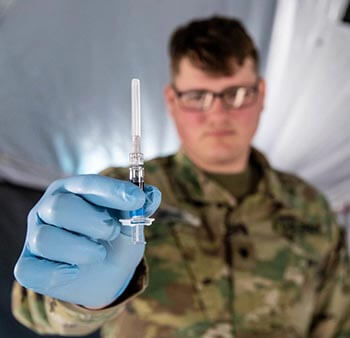Do You Have COVID-19? Influenza? Or is it RSV? Here’s What to Look For
 Air Force Staff Sgt. Cody Emery, 30th Medical Group medical lab technician, prepares a COVID-19 test sample for processing April 8, 2021, at Vandenberg Air Force Base, California (Photo by: Michael Peterson, Space Launch Delta 30 ).
Air Force Staff Sgt. Cody Emery, 30th Medical Group medical lab technician, prepares a COVID-19 test sample for processing April 8, 2021, at Vandenberg Air Force Base, California (Photo by: Michael Peterson, Space Launch Delta 30 ).
Are you or a loved one not feeling well? Feverish? Starting to cough?
It's hard to know what it is. Is it COVID-19? The seasonal flu? Or is it respiratory syncytial virus, also known as RSV?
All three have similar symptoms, with fever being the most common. If you want to know for sure, you can check with your health care provider. These viruses could become severe in a short span of time, so starting on the right treatment can be important.
Below is a rundown of virus symptoms and potential risks.
COVID-19 Symptoms
The good news about COVID-19 vaccines is they are effective in reducing the chances of severe disease, hospitalization, and death.
The Centers for Disease Control and Prevention, or CDC, advises that getting a COVID-19 vaccine and a booster shot when eligible are the best tools to protect you and your family against COVID-19.
People with COVID-19 report a wide range of symptoms that may appear two to 14 days after exposure to the virus. Symptoms are likely to include fever, cough, fatigue, muscle aches, headache, sore throat, and possibly a temporary loss of smell and taste. The CDC published a full list of potential COVID-19 symptoms.
"COVID-19 infection usually starts in our head. It later affects our lungs and the rest of our body," said Dr. David Hrncir, medical director, Central Vaccine Safety Hub, Defense Health Agency-Immunization Healthcare Division.
Preliminary research has shown that the Omicron variant does not spread into the lungs as aggressively as the Delta variant, which was dominant in the United States until Omicron emerged.
People who have received COVID-19 vaccines can still experience COVID-19 infections that may have symptoms similar to the common cold or flu. Patients might need testing to help confirm a diagnosis.
To help you evaluate your symptoms, the CDC has a self-tracker tool that asks demographic questions and whether you have "life-threatening symptoms that may require urgent care."
Influenza Symptoms
Influenza - better known as the flu - is also circulating. The CDC warns that the flu usually comes on suddenly, and can be more dangerous than a common cold.
 Soldiers with Headquarters and Headquarters Battalion, 101st Airborne Division (Air Assault), received their influenza vaccinations Nov. 8, 2021, at Fort Campbell, Kentucky. Medics assigned to HHBN administered shots to protect against the virus (Photo by: Army Sgt. Tanis Kilgore).
Soldiers with Headquarters and Headquarters Battalion, 101st Airborne Division (Air Assault), received their influenza vaccinations Nov. 8, 2021, at Fort Campbell, Kentucky. Medics assigned to HHBN administered shots to protect against the virus (Photo by: Army Sgt. Tanis Kilgore).
The flu virus can cause mild to severe illness, and at times can lead to death, even during mild flu seasons. Flu activity was unusually low last winter in the United States and globally, resulting in an estimated 22,000 U.S. deaths. That compares to 52,000 U.S. deaths during the 2018-2019 flu season, the last year for full reporting.
People who have the flu typically have some or all of the symptoms that the CDC lists on its site, including fever, cough, sore throat, and fatigue. Some people may have vomiting and diarrhea, although this is more common in children than adults.
The simultaneous surge of flu and COVID-19 cases nationwide is another important reason to get a flu vaccine to protect you. It is possible to get both the flu and COVID-19 at the same time, which would increase the risk of severe illness.
"Decreasing the impact of influenza with your annual flu vaccine lessens the risk of having a co-infection of several viruses with all the unique symptoms from each viral infection impacting you at the same time," Hrncir said.
Vaccination for the flu is available at military medical treatment facilities, clinics, and at commercial pharmacies and doctors' offices.
People who are at a higher risk of flu complications include children, those over 65, and those with compromised immune systems. There are certain therapeutics that may help these risk groups.
CDC has an influenza web page that provides information on current trends in the disease.
Is It RSV?
A third threat this winter is the respiratory syncytial virus, also known as RSV, which is a mostly seasonal contagious respiratory virus. It most frequently afflicts premature infants, and children under two years old with chronic heart or lung disease.
RSV can affect adults as well, especially those 65 older and those with compromised immune systems.
Fever is one of RSV's primary symptoms, along with runny nose, cough and a decrease in appetite. However, more serious symptoms of RSV like difficult or rapid breathing may require hospitalization. Watch out for these symptoms and seek medical care immediately.
Mild RSV typically resolves on its own. There is no vaccine to prevent RSV or specific medication to treat this virus. Recommended home treatments for children who show signs of RSV include fever reduction with over-the-counter medication; conservative nasal suctioning; and offering plenty of fluids to stay hydrated.
Otherwise healthy adults who get infected with RSV usually have mild or no symptoms. Symptoms are typically consistent with an upper respiratory tract infection. The disease usually lasts less than five days, according to the CDC.
During the winter cold and flu season, make sure you review the CDC's public health care precautions to take good care of yourself and your loved ones.